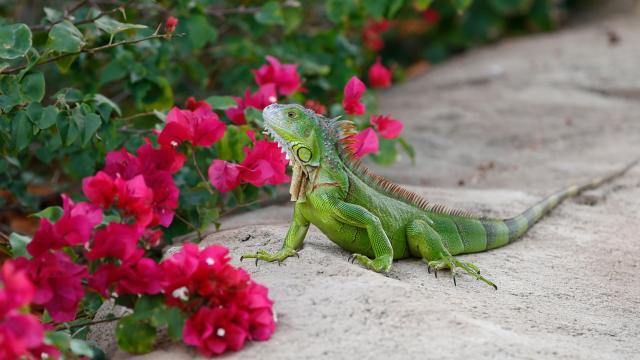With the spread of green iguanas spiralling out of control in Florida, the state’s wildlife agency is urging homeowners to take it upon themselves to exterminate the non-native lizard, and without the need for permits.
To tackle the spread of green iguanas, the Florida Fish and Wildlife Conservation Commission is now encouraging residents to kill the animals on their own property, as well as 22 areas of public land.
These resilient animals are currently experiencing a population spurt in Florida, with climate change and shifts in vegetation a likely contributing factor. They’re a big headache for Floridians, as they cause damage to seawalls, footpaths and gardens. They can also carry and spread disease.
“Homeowners do not need a permit to kill iguanas on their own property, and the FWC encourages homeowners to kill green iguanas on their own property whenever possible,” the agency noted in a statement.
[referenced url=”https://gizmodo.com.au/2018/03/florida-wildlife-officials-are-killing-invasive-iguanas-by-smashing-in-their-skulls/” thumb=”https://i.kinja-img.com/gawker-media/image/upload/t_ku-large/bzqzpft0koq18kvn6b0h.jpg” title=”Florida Wildlife Officials Are Killing Invasive Iguanas By Smashing In Their Skulls” excerpt=”As part of a $US63,000 ($80,048) research project to devise new and effective ways of pruning back the skyrocketing iguana population in south Florida, wildlife officials in the state have started to smash in the heads of iguanas, saying it’s a quick and “humane” form of euthanasia. Sounds dreadful – and it is – but the situation in Florida is more complicated than it appears.”]
No suggestions were offered as to how homeowners were supposed to kill the lizards, aside from saying green iguanas are not a protected species, though they are protected by anti-cruelty laws.
That said, Florida wildlife officials have been exterminating green iguanas themselves by smashing in their skulls, or by using bolt guns similar to those employed in the livestock industry. The head-bashing technique has been described by Florida’s wildlife officials as being quick and humane, and within the bounds of the state’s anti-cruelty laws.
Understandably, some Floridians may feel uncomfortable about having to perform the deed themselves, particularly if a baseball bat is involved.
In those cases, residents “that trap iguanas on their property may be able to obtain euthanasia services from local exotic veterinarians, humane societies or animal control offices depending on the location and availability of services,” the FWC wrote in its statement, adding that captured green iguanas “cannot be relocated and released at other locations in Florida”.
Green iguanas are normally found in Central America, some eastern Caribbean islands and the tropical portions of South America. The lizards were introduced to Florida in the 1960s, and can now be found in most parts of the state, with sightings as far north as Pensacola and Panama City Beach.
Male green iguanas grow to around 1.5m long and weigh upwards of 7.7kg. Females grow to similar lengths, but weigh no heavier than around 3.2kg. These lizards live on the ground, bushes and trees, and can swim in both fresh and saltwater. Green iguanas have had little difficulty adapting to urban environments, where they can cause serious damage.
“Females dig egg chambers that may contain nearly 80 feet [24m] of interconnected tunnels and multiple entrances and lay clutches of anywhere from 14-76 eggs,” noted the FWC. “Green iguanas can live up to 10 years in the wild and 19 years in captivity.”
To deter iguanas from encroaching on their property, residents are being asked to “humanely harass” the animals, spray them with water, remove their preferred plants from gardens, fill in holes, and hang wind chimes (an acoustic deterrent) and CDs (a bright visual deterrent).
Green iguanas aren’t the only non-native species currently creating problems in Florida. The Buremese python has found a comfortable niche in the Everglades, where it consumes a wide variety of prey.
